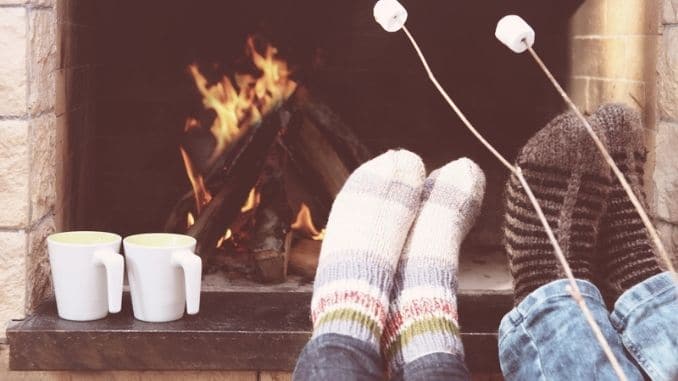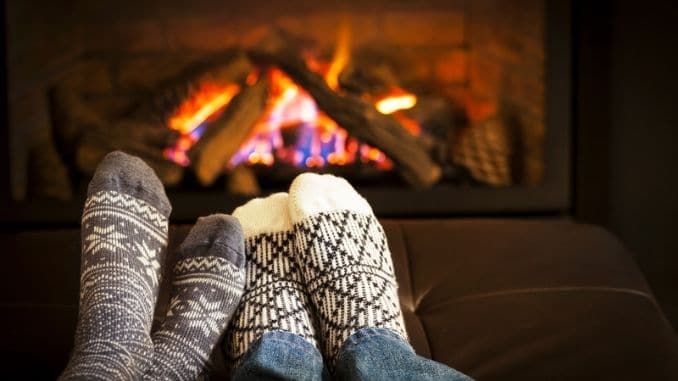“Don’t forget your coat! You’ll catch a cold!”
Did your mom or dad tell you that before you went outside?
You may have thought a coat wasn’t necessary at that age, but it turns out that temperature can affect your health.
As we move into the colder months of the year, it’s going to become more important to find ways to stay warm.
We have several tips for you in this post, along with some information on why avoiding cold stress can be good for you this winter season.
Can Cold Temperatures Make You Sick?
Cold temperatures don’t directly make you sick, but they can put you at a higher risk of catching a cold, the flu, or another type of infection.
That’s because when it’s cold outside, the following factors change:
Bugs Thrive in Chilly Temperatures
Research suggests that certain bacteria and viruses may replicate more efficiently in chilly temperatures, meaning there may be more of them around waiting to make you sick.
In one study on human rhinoviruses (HRVs), for instance, which are responsible for about half of the cold-like illnesses, scientists found that the bugs replicated better in colder temperatures.
And in a 2016 study, researchers found that both temperature and humidity may contribute to the risk of an HRV infection.
Specifically, a decrease in temperature during the preceding few days increased the risk of an HRV infection in a cold climate.
Viruses Love Dry Air
In the winter, the air is much dryer than it is in the summer, generally speaking. That’s why it’s more common to suffer from dry skin and chapped lips.
Research shows that dry winter air also allows the flu virus to spread. In a 2010 study, scientists reported that there were often significant drops in humidity in the weeks before a flu outbreak.
“This dry period is not a requirement for triggering an influenza outbreak,” said lead author Dr. Jeffrey Shaman of Oregon State University, “but it was present in 55-60 percent of the outbreaks we analyzed, so it appears to increase the likelihood of an outbreak.”
In the winter, because of low humidity, there are fewer water molecules around to interfere with the way a virus travels in the air. In a 2011 study, researchers reported that improving ventilation and humidity in an indoor environment helped reduce the risk of flu infection.
During the warm, healthy winter, not only is the outdoor air drier, but indoor air is, too, particularly if you are using central heating. That means that whether you’re indoors or out, dry air may increase your risk of getting sick.
Being Cold Can Affect the Immune System
When you’re cold, your immune system may not be as efficient at fighting off infections.
In a 2015 study, scientists noted that most rhinovirus strains replicate better at cooler temperatures, and found that cooler temperatures could increase the risk of you catching a cold (or other infection) in part because it diminishes the immune system’s antiviral response.
More specifically, colder temperatures weakened the nose’s first line of immune defenses, allowing the virus to invade and multiply.
It’s also true that during the winter months, many people get less vitamin D because they don’t get as much sun exposure. (The skin makes vitamin D when exposed to the sun.) Vitamin D plays an essential role in immune function.
Cold Weather Drives Us Inside—with Others
Finally, colder temperatures tend to drive people inside, where they encounter lots of other people. The more people you come into contact with, the higher your risk of catching something.
An increased number of people sharing dry air inside warm, healthy winter spaces can lead to higher transmission of the cold or flu virus.
10 Ways to Stay Warm This Winter
Considering the risks of cold weather and dry air, we have 10 tips to increase your odds of enjoying a happy, healthy winter season.
1. Dress in Layers
Winter is the time to wear more clothes for a warm, healthy winter. That way, you can stay warm when you’re outside, and then shed some layers so you don’t feel too warm when you go inside.
This is important as you don’t want to sweat too much—that can make you feel colder.
A good rule of thumb on cold days is to choose some sort of insulating undergarment (long underwear or a thinner form of first layer clothing), then follow with a long-sleeved shirt, sweater, and coat.
On super cold days, consider using fleece leggings or insulated pants as well.
If you feel like the abominable snowman after you’ve finished dressing, you’re doing it right for a warm, healthy winter. That’s because it’s not so much about layers, but about the air that’s trapped between them. The more layers you have, the more warm air you carry around with you.
The right fabrics for winter:
- Synthetic fabrics or merino/silk to help wick moisture away from your skin
- GORE-TEX or other moisture-shedding outer layers
- Wool and other insulating fabrics
- Avoid cotton—it tends to leave you damp and cold
2. Wear Hats, Gloves, Scarves, and More
Speaking of “more” clothes, it's also a good idea to pull out the warm scarves, hats, gloves, earmuffs, neck warmers, and face masks so they're ready when you need them. It's amazing how the addition of just a hat can make a huge difference in how warm you feel.
If you have really cold hands through the winter, consider getting some hand warmers. They don’t cost a lot and they can make a big difference when you need to be outdoors.
3. Keep Your Feet Warm
We all know that cold feet can make winter miserable. Avoid this unpleasantness by investing in some warm socks and insulated boots. Warm slippers inside can make a big difference too, and keep you from turning up the heat too much.
Keep in mind that feet sweat, and that can make you feel cold too. Wear wool socks or “smart wool” socks to help prevent sweating, or keep an extra pair of socks handy so you can change.
Finally, don’t layer up and then jam your feet into your boots. If the fit is too tight, that will restrict blood flow and lead to cold and numb toes. Use thin sock liners if needed, and make sure your boots fit well.
4. Warm Up Your Bed
If you go to bed at night and feel cold—even if it’s just your hands and/or feet—you’ll have a hard time getting to sleep. And sleep is important for a robust immune system!
So warm up your bed somehow. You can use an electric blanket, or take a warm water bottle with you and put it down by your feet for a warm, healthy winter.
You can also toss a blanket in the dryer and pull it out just before going to bed, use flannel sheets, and add extra blankets.
5. Drink and Eat Yourself Warm
Warm beverages and soups can warm you up from the inside out. Look for hot food choices on cold days, and step up your use of tea, coffee, hot chocolate, and hot cider.
Making these beverages in a hot mug can also help keep your hands warm!
Another good idea: fix your favorite hot drink in the morning, put it in an insulated bottle, and take it with you.
6. Stay Active!
Even light exercise—such as taking a walk, spending some time on an exercise bike, or doing some housework—will help keep you warm.
Find ways to keep moving even when it’s cold outside and you’ll stay warmer overall.
7. Snack When You’re Hungry
After eating a regular-sized meal, you are at risk of getting colder because your blood rushes to the digestive system to process that food.
If you snack instead, however—eat just a little bit—you don’t tax the digestive system but you do get your body burning energy, which can make you warmer. Choose healthy snacks like nuts, dark chocolate, yogurt, or dried fruit.
8. Use a Humidifier
If you’re using indoor heat, it will cause the air indoors to be even dryer in the winter months. That can not only increase your risk of getting sick, but it may also make you feel a little colder.
Humid air generally feels warmer than dry air, so consider using a humidifier in your home. Water vapor from the humidifier slightly increases the air’s ability to hold onto heat.
9. Decorate for Cold Weather
How warm is your home? You can make it warmer by making some changes in the winter months.
Start by checking your drapes. If they are thin and easily let cold air through, consider getting some thicker ones that will help trap cold air.
You may also want to insulate your windows with window insulation kits.
Next, use more rugs on floors, particularly by your bed, in the bathroom, and near places where you sit.
They can help keep your feet warm and protect you from cold, hard floors.
Rearrange the furniture so it’s not near the walls or windows, and so nothing is blocking your heating vents. Reverse the direction on your ceiling fan so that it blows warm air down, keeping the heat in your house from gathering near the ceiling. (Hot air rises.)
Finally, place things like bookshelves and cabinets up against the exterior walls. They’ll help reduce heat loss.
10. Stay Hydrated
Interestingly, water helps you retain body heat! The more water you have in your system, the easier it will be for your body to keep itself warm.
Yet it’s harder in the winter to drink enough water every day. According to a study from the University of New Hampshire, cold weather increases your risk of dehydration, because people just don’t feel as thirsty when the weather is cold.
Yet the body may need more water in the winter than in the summer. It loses it when breathing, and when working hard under those extra layers of clothing. Sweat evaporates quickly in cold, dry air, meaning you need to replenish those fluids.
Even slight dehydration can result in symptoms like fatigue, headaches, and loss of focus, especially during a warm, healthy winter.
So take a water bottle with you and keep sipping throughout the day. The best way to see if you’re getting enough is to check your urine—the color should be a pale yellow to clear. If it’s a darker yellow, you’re not getting enough.

The winter can be a beautiful time of year, so use the helpful hints above to keep happy and healthy throughout the season.
During the colder winter months, it is even more important to take care of yourself, so grab your mittens, snuggle up under that cozy blanket, and enjoy that warm cup of tea. You’ll be sure to stay warm and healthy all season long.
Colder days mean more time spent indoors. Looking for the perfect workout you can do from the comfort of your own home? Click here to learn more.















